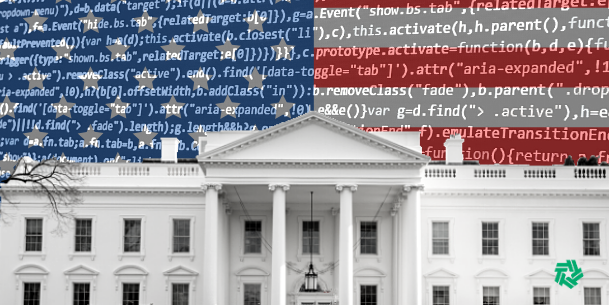
Members of Congress want State Dept to go to bat for LGBTQ diplomats
In today's Federal Newscast, top Democrats on the House Foreign Affairs Committee are calling on the State Department to expand opportunities for LGBTQ diplomat...
To listen to the Federal Newscast on your phone or mobile device, subscribe in PodcastOne or Apple Podcasts. The best listening experience on desktop can be found using Chrome, Firefox or Safari.
- Many political appointees, along with the vice president, can expect a freeze on their salaries to continue through at least the end of 2022. The Office of Personnel Management released details that the impacted groups are paid at or above the level for Executive Schedule IV. That includes employees serving in Executive Schedule positions and political appointments. The pay freeze extension comes after Congress last pushed the freeze out to February 18. Pay rates for these groups have remained flat since 2014. (Federal News Network)
- The American Federation of Government Employees is calling on the Office of Personnel Management to continue maximizing telework and remote work options for its employees. This comes as OPM wants more of its employees to start returning to the office later this month, according to an AFGE press release. An OPM official told Federal News Network that the agency will continue collaborative efforts with union partners as it navigates an evolving hybrid work environment.
- A rainy day fund at the State Department took a hit from COVID-19, and may take years to recover. The agency’s Bureau of Consular Affairs is drawing down on carryover funds, after passport and visa revenue dried up at the start of the COVID-19 pandemic. The bureau relies on these carryover funds from prior years to help fund its operations. The bureau by the end of fiscal 2019 had about $2 billion in this fund, enough to cover more than half its costs that year. By the start of fiscal 2021, that fund shrank to $1.2 billion. While demand for passports and visas is growing, State Department officials told the Government Accountability Office that that fee revenue may not return to pre-pandemic levels for several years. (Federal News Network)
- Top Democrats on the House Foreign Affairs Committee are calling on the State Department to expand opportunities for LGBTQ diplomats. More than a third of countries currently deny visas to same-sex spouses, making these diplomatic assignments more difficult for many Foreign Service families. Committee Chairman Gregory Meeks (D-N.Y.) joins committee members Joaquin Castro (D-Texas), David Cicilline (D-R.I.) and Dina Titus (D-Nev.) in calling on the State Department to ensure same-sex couples receive the same the same diplomatic immunity and privileges as their peers, regardless of where they’re stationed.
- The Biden administration is facing pushback from two powerful industry groups over its latest Buy American policy. The Office of Management and Budget released new guidance on April 18 requiring the use of American-made iron and steel for federally funded infrastructure projects from the Infrastructure Investment and Jobs Act. But the U.S. Chamber of Commerce and the IT Industry Council say OMB’s policy may not be a workable approach. The council said the policy does not reflect the global nature of supply chains or the feasibility of coming into compliance with the law’s requirement.
- The Biden administration is telling agencies to improve customer experience around five cross-cutting areas. Those include helping members of the public who are approaching retirement age, recovering from a disaster, or transitioning from active-duty military service. Agencies are also directed to improve services that support low-income mothers and children, as well as those suffering from a sudden financial loss and may be newly eligible for public assistance programs. The administration is flagging these as life experiences that require service from multiple agencies and programs, and may be difficult for some users to navigate these layers of bureaucracy.
- The Justice Department’s inspector general is reviewing how the FBI is grappling with the dangers of an increasingly digital world. The DOJ IG is kicking off an audit to evaluate the actions the FBI is taking to protect sensitive investigations and operations from technological compromise. The audit will also review how the FBI trains its personnel to guard against the perils of technology. The IG also plans on looking at how the FBI is using technological advancements for counterintelligence against U.S. adversaries.
- A Coast Guard advisory group is digging into cybersecurity collaboration between federal agencies and the U.S. maritime industry. The National Maritime Security Advisory Committee announced an upcoming meeting for May 3 and 4. The committee will discuss how to improve information sharing about cyber risks that could cause a transportation security accident. Several U.S. ports have been hit with ransomware and other cyber attacks in recent years.
- TRICARE is expanding its coverage for childbirth options and breastfeeding support programs. A new five-year trial will cover six non-medical doula visits before birth. The doulas must be certified by one of five organizations. TRICARE will also now cover lactation counseling and coverage for group breastfeeding counseling as well.
- A recent study from the Defense Department confirms the importance of COVID booster shots. Active duty service members who received a COVID-19 booster were significantly less likely to be infected and show symptoms of the disease during the Omicron variant this winter. The Omicron surge dwarfed any other variant in the amount of people it infected so far. The booster reduced odds of developing symptomatic COVID by 63% compared to those who were vaccinated but not boosted. The rate of active duty service members getting their booster shot is low. As of January 31, only about 25% of active duty service members were boosted.
- The Veterans Affairs Department joins the growing list of agencies receiving extra IT modernization money. VA is receiving an extra $10.5 million to accelerate its move to a single sign-in service for its VA.gov and MyHealth portals. The Technology Modernization Fund board made VA the third agency since March and seventh since Congress appropriated $1 billion in the American Rescue Plan Act to receive an award. VA said the extra funding will help support the transition of existing users to Login.gov, create an in-person identity verification option for veterans and initiate a pilot to use physical security keys for multi-factor authentication, improving accessibility, equity and security.
- Some Republican lawmakers voice concerns about investments for the Thrift Savings Plan. Senators Marco Rubio (R-Fla.), Tommy Tuberville (R-Ala.) and Tom Cotton (R-Ark.) said they don’t want the TSP putting any money toward Chinese companies. The senators have placed holds on the four board nominees for the agency in charge of the TSP — the Federal Retirement Thrift Investment Board. The lawmakers call on the prospective board members to commit to preventing any Chinese I Fund investments. They’re asking the nominees for a “prompt reply.”
Copyright © 2024 Federal News Network. All rights reserved. This website is not intended for users located within the European Economic Area.
Eric White
Eric White is news anchor and Federal Drive producer at Federal News Network.
Follow @FEDERALNEWSCAST
Related Stories
Amelia Brust/Federal News Network




